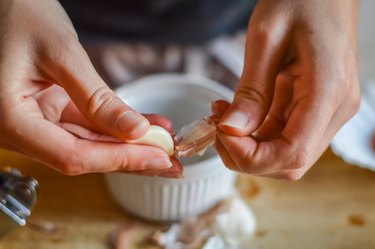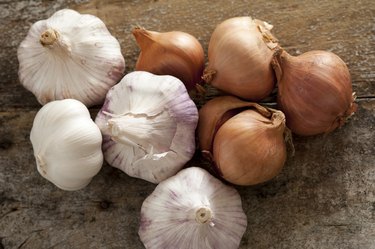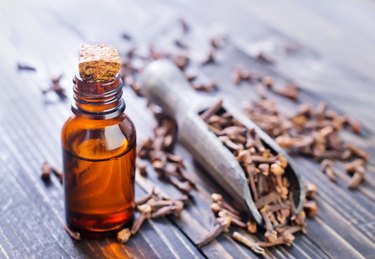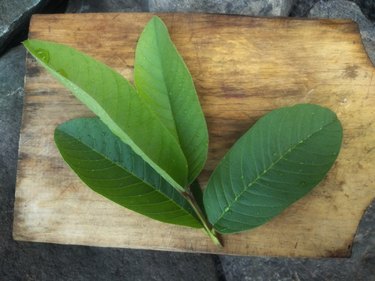

The Refresh is helping you freshen up on your oral-care knowledge and upgrade your dental-hygiene routine.
There's nothing more annoying than a toothache, and to make things worse, it can often happen at the worst possible time.
"Toothaches don't respect normal dentist business hours," says Sanda Moldovan, DDS, a periodontist at Beverly Hills Dental Health and Wellness in Beverly Hills, California. "They quite often strike you in the middle of the night when you are trying to sleep — or over the weekend when your dentist's office is closed."
Video of the Day
Video of the Day
While there is no substitute for seeing your dentist as soon as you can get an appointment, she says, there are some home remedies for toothaches or infections that will provide some immediate relief.
Here, dentists break down the toothache remedies they suggest.
1. Apply Warm or Cold Compresses
"The key to [treating] tooth pain at home is trying to diagnose where the pain is coming from," says Evelyn Taly Huaman, DMD, an oral plastic surgeon at Taly Dental Specialists in San Diego, California. "If you have been grinding at night, then you'll have pain all over, mostly bothering you on your jaw and jaw joint. Then you have to treat it as a muscle spasm or injury."
Dr. Huaman recommends applying a warm or cold compress around the jaw joint, although (surprise!) she says a bag of frozen peas is actually the best because it conforms to your face.
2. Rinse Your Mouth With Salt Water

"If your mouth feels hot, and you feel a lot of inflammation and soreness, then saline warm water rinses work really well," Dr. Huaman says. "They are mild rinses, so you cannot be vigorous. Allow the salt water to sit in your mouth a little bit and do not spit — slowly release the water in the sink."
Dr. Huaman says salt-water rinses can also help if your mouth is sore because you haven't flossed your teeth in a week (or more).
A December 2017 study in the Journal of the Indian Society of Pedodontics and Preventive Dentistry concluded that salt-water rinses can help control plaque buildup and prevent oral diseases, so this might be something to consider doing on a regular basis, even once the pain has passed, but be sure to discuss it with your dentist. And remember that there's no substitute for regular brushing and flossing.
3. Bite a Cool Tea Bag
"If you are bleeding from a small accident, then immediately get a cool tea bag and bite on it for 20 to 30 minutes nonstop," Dr. Huaman says." Do not peek at it, do not check it. Put a timer on and do not remove the tea bag for 20 to 30 minutes. You can check the site and do this additionally for another two times. If the bleeding does not stop then you have to go to urgent care" or the Emergency Department.
According to Dr. Moldovan, biting a peppermint tea bag may be extra effective if your issue is swollen gums, because peppermint has a soothing effect. Try Twinings Pure Peppermint tea bags ($10 for 50, Amazon).
4. Chew Some Garlic

"Garlic is a popular remedy for toothaches, especially when the pain is due to the presence of cavities," says Joseph Salim, DMD, a dentist at Sutton Place Dental Associates in New York City.
To use garlic for a toothache, he recommends chopping a clove of garlic and applying it to the painful area for its numbing effect. He also suggests chewing slices of raw onion because, like garlic, it may help relieve pain caused by inflammation of the gums.
What About Garlic Pills?
There's no evidence that taking garlic pills will help with a tooth infection or toothache.
5. Apply Aloe Vera Gel
We all know that aloe vera has healing properties that can help soothe and cool your skin, but what about your teeth?
A 2011 study in the Journal of Indian Society of Periodontology found that applying aloe vera gel to infected gums resulted in improvement to the infectious inflammatory disease periodontitis.
As such, you could try applying aloe vera gel to the painful area and see if it helps, but be sure to only use a small amount and to rinse it off after use. If possible, speak to your dentist before trying this remedy.
Warning
Aloe can be poisonous if swallowed, according to the National Library of Medicine. Only apply a small amount to the affected area, and don't use this as a long-term solution for tooth pain. Stop using aloe and seek medical help if you have symptoms of aloe poisoning, including difficulty breathing, diarrhea, loss of vision, rash, skin irritation, severe abdominal pain, throat swelling or vomiting.
6. Eat Some Ginger

"Ginger is known for its anti-inflammatory and antiseptic properties and can be used to create a special paste to be applied to the teeth with a cotton swab or Q-tip," Dr. Salim says.
To create a paste, peel and chop some ginger and then blend the pieces in a blender or food processor with a little bit of oil until smooth (olive or avocado oil work, or any cooking oil you have on hand).
A small January–March 2021 randomized clinical trial in the Journal of Ayurveda and Integrative Medicine found that taking dried ginger powder capsules was as effective as ibuprofen in relieving toothache pain following oral surgery, so it could be a good alternative to pills.
7. Rinse With Baking Soda
"Baking soda has antibacterial properties that could relieve pain resulting from the accumulation of bacteria," Dr. Salim says.
He suggests mixing a teaspoon of baking soda into a glass of warm water and using it to rinse your mouth for at least 20 seconds, repeating as needed.
8. Swish With Whiskey
It might sound strange, but Dr. Salim says rinsing the part of your mouth where the pain is located with whiskey or rum for a couple of minutes could do the trick.
He cautions that this is "not about drinking alcohol, but rather taking advantage of alcohol's anesthetic function."
Just keep in mind that you might have mild burning at the site of the pain at first.
Is It a Toothache or a Sinus Infection?
“Sometimes tooth pain in the upper jaw can be referred pain radiating from a larger, more complicated infection, such as a sinus infection,” Dr. Huaman says. “This is like the chicken and the egg. Did the tooth infection cause the sinus infection? Or do you just have a sinus infection that radiates to tooth pain?”
She recommends applying pressure to your cheekbone area. If you feel a sense of relief, then it’s probably a temporary sinus infection. However, if applying pressure causes you pain, that could be “a sign of a tooth infection at the tip of the root in the sinus that can cause severe bone destruction and puncture through the sinus membrane.” If so, it’s best to see a dentist as soon as possible.
9. Apply Clove Oil

"Clove oil is still used in dentistry today because it contains something called eugenol and has been used for centuries as a natural anesthetic and antibacterial solution," says Rhonda Kalasho, DMD, a dentist at GLO Modern Dentistry in Los Angeles, California. "I still recommend clove oil for my patients after having a tooth pulled or for those who may have had a localized gum infection treated."
Dr. Salim echoes this advice, and suggests applying a drop of clove oil to a cotton ball and pressing it against the affected area, repeating the process a few times a day for the best effects. He also suggests making it into a mouthwash by adding two or three drops of clove oil to water.
10. Try Thyme Oil
"This natural herb has both antibacterial and antioxidant agents which can help reduce bacterial growth in the dental cavity," Dr. Moldovan says.
As with clove oil, all you have to do is add a drop of thyme oil to a cotton ball and place it against the affected area.
11. Take Enzyme Support
Dr. Moldovan recommends taking a dietary supplement called Enzyme Support ($29, Orasana.com), which can be purchased online or at your local health store.
"They are an excellent therapy for tooth and mouth pain because they contain the ingredient bromelain, which has been scientifically proven to be as effective a pain-relieving agent as ibuprofen," she says.
12. Chew Guava Leaves

Guava leaves are loaded with anti-inflammatory and antimicrobial properties that eliminate harmful bacteria and help alleviate tooth pain. The treatment usually involves chewing on fresh guava leaves or making them into a mouthwash by pouring boiling water over crushed guava leaves.
A September 2019 study in the International Journal of Engineering Research and General Science showed that a guava leaves mouthwash helped severely reduce pain in 100 participants reporting varying levels of tooth pain. It concluded that this type of mouthwash is a non-pharmacological, cost-effective and easier method for treating oral problems.
However, guava leaves have not been fully tested for toxicity, so they should be used with caution and in moderation.
13. Try Acupuncture
Not everyone believes in the pain-relieving qualities of this traditional Chinese medicinal practice, which involves placing tiny needles at strategic points on the body.
But an April 2014 study in the Journal of Acupuncture and Meridien Studies found that just one session of acupuncture reduced pain intensity in 72 percent of 120 patients awaiting care in an emergency dental care center.
So if you've always wanted to try it, now might be the time.
14. Take Over-the-Counter Pain Relievers
"Toothaches are incredibly painful because a lot of the time the toothache can be caused by bacteria that reaches the nerve," Dr. Kalasho says.
And when you have tooth nerve pain, relief is just about the only thing on your mind. "Once it reaches the nerve, unfortunately, nothing really helps unless the tooth is treated by a professional dentist."
However, if you don't have any conflict with pain relievers, Dr. Kalasho recommends taking over-the-counter, extra-strength Tylenol with ibuprofen to manage the pain until you can get antibiotics.
- Journal of the Indian Society of Pedodontics and Preventive Dentistry: "Comparative evaluation of salt water rinse with chlorhexidine against oral microbes: A school-based randomized controlled trial."
- Journal of Indian Society of Periodontology: "Aloe vera: Nature's soothing healer to periodontal disease."
- Journal of Ayurveda and Integrative Medicine: "Effectiveness of ginger on pain following periodontal surgery – A randomized cross-over clinical trial."
- International Journal of Engineering Research and General Science: "A study to assess the effectiveness of the guava leaves mouth wash for patients with oral problem."
- Journal of Acupuncture and Meridien Studies :"Acupuncture in the Management of Acute Dental Pain"
- U.S. National Library of Medicine: "Aloe"
- National Center for Complementary and Integrative Health: "Bromelain"
Is this an emergency? If you are experiencing serious medical symptoms, please see the National Library of Medicine’s list of signs you need emergency medical attention or call 911.



